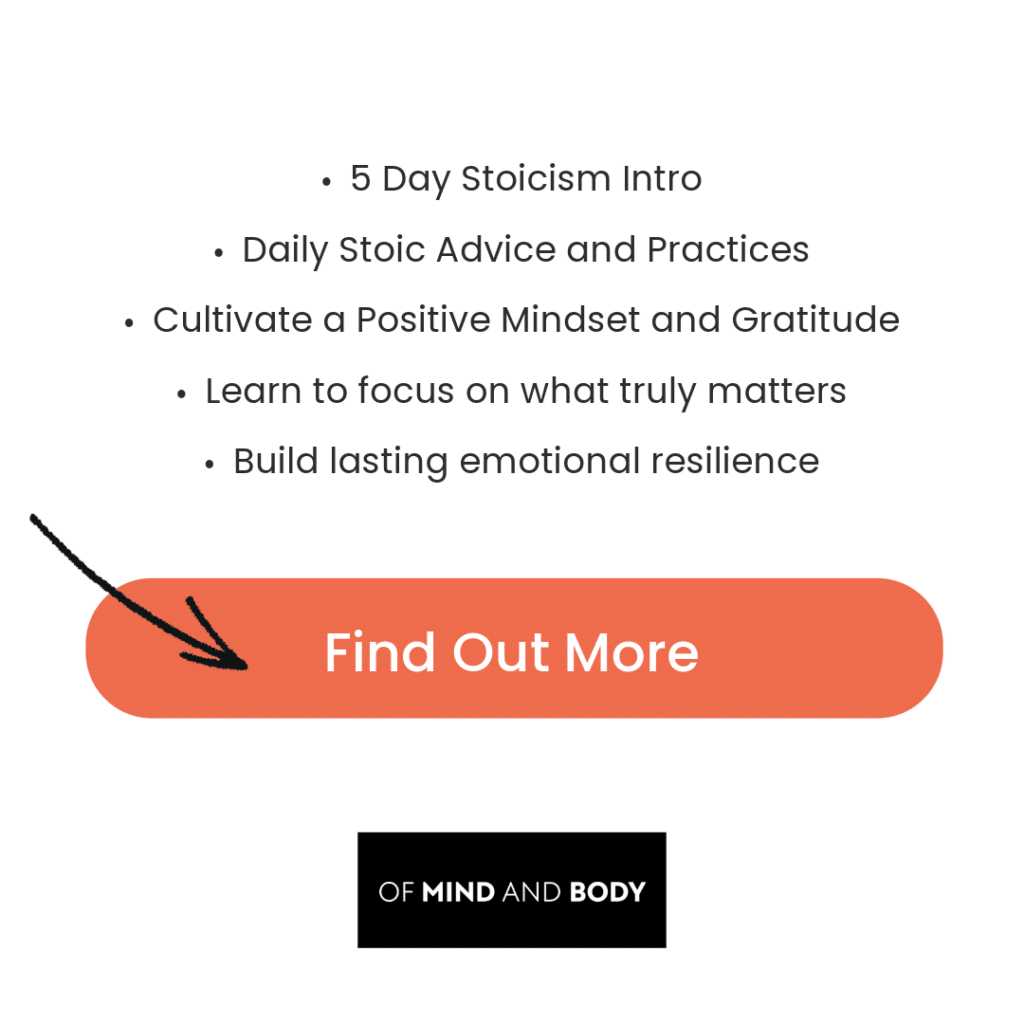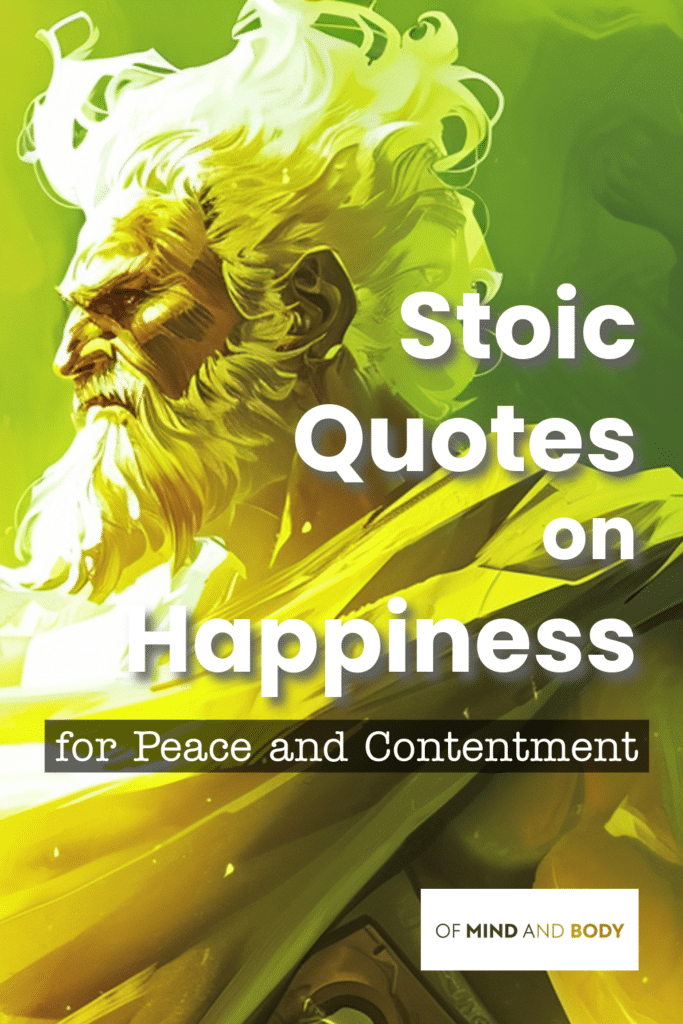
In the quest for fulfilment, these ancient “Stoic Quotes on Happiness” offer timeless wisdom that resonates even in today’s fast-paced world. Rooted in the teachings of philosophers like Epictetus, Seneca, and Marcus Aurelius, Stoicism provides profound insights into the pursuit of contentment and peace of mind.
This article delves into the Stoic quotes on happiness, joy and pleasure, exploring how their teachings can be applied to modern life. Through a selection of poignant quotes, we uncover the essence of Stoic happiness, which often contrasts with contemporary views on what it means to live a fulfilled life.
The Stoics’ View on Happiness:
For the Stoics, happiness was not found in external possessions or achievements but within the self. It was a product of one’s own mind and attitudes, rather than the result of external circumstances. This philosophical approach suggests that by controlling our perceptions and reactions, we can maintain tranquillity and joy, regardless of life’s ups and downs.
Stoicism teaches that true happiness is achieved through the cultivation of virtue, self-control, and rationality. It is about embracing what life presents, focusing on what we can control – our thoughts, actions, and responses – and letting go of what we cannot. This Stoic view of happiness is profoundly empowering, offering a path to a serene and balanced life, anchored not in the pursuit of material wealth or external validation, but in the richness of character and inner peace.
- “The happiness of your life depends upon the quality of your thoughts.” – Marcus Aurelius
- “The happiness of those who want to be popular depends on others; the happiness of those who seek pleasure fluctuates with moods outside their control; but the happiness of the wise grows out of their own free acts.” – Marcus Aurelius
- “Remember that very little is needed to make a happy life; it is all in yourself, in your way of thinking.” – Marcus Aurelius
- “The art of living is more like wrestling than dancing.” – Marcus Aurelius
- “Don’t seek to have events happen as you want them to, but instead want them to happen as they do happen, and your life will go well.” – Epictetus
- “Happiness and freedom begin with a clear understanding of one principle: Some things are within our control, and some things are not.” – Epictetus
- “Wealth consists not in having great possessions, but in having few wants.” – Epictetus
- “Fortify yourself with contentment, for this is an impregnable fortress.you will have over your own life.” – Epictetus
- “True happiness is… to enjoy the present, without anxious dependence upon the future.” – Seneca
- “Begin at once to live, and count each separate day as a separate life.” – Seneca
- “It is not the man who has little, but he who desires more, that is poor.” – Seneca
- “A good character is the only guarantee of everlasting, carefree happiness.“ – Seneca
Stoic Quotes on Happiness, Joy and Pleasure from Marcus Aurelius
“The happiness of your life depends upon the quality of your thoughts.”
Marcus Aurelius
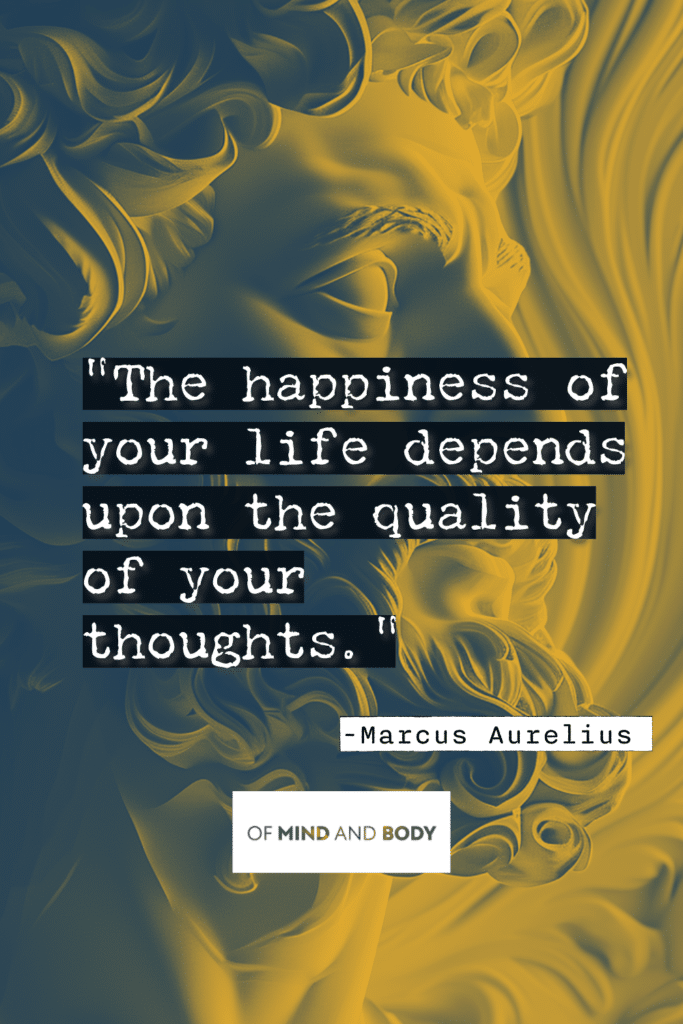
The Wisdom Behind the Words:
These quotes by Marcus Aurelius, the prominent Stoic philosopher, highlight the profound impact of our thoughts on our overall happiness. It suggests that happiness isn’t primarily derived from external circumstances, but rather from the quality of our internal dialogue. Our thoughts shape our perceptions, attitudes, and ultimately our experiences. This perspective empowers us, indicating that by cultivating positive, rational, and constructive thoughts, we can significantly influence our own happiness.
Everyday Applications:
In daily life, this quote encourages us to be mindful of our thought patterns. When faced with challenges, we can choose to focus on positive aspects or lessons learned, rather than dwelling on negativity or failures. Practising gratitude regularly can shift our mindset to appreciate the good in our lives, fostering happiness. Additionally, engaging in activities that promote positive thinking, such as meditation or journaling, can help us maintain a healthy mental state that supports overall well-being.
“The happiness of those who want to be popular depends on others; the happiness of those who seek pleasure fluctuates with moods outside their control; but the happiness of the wise grows out of their own free acts.”
Marcus Aurelius
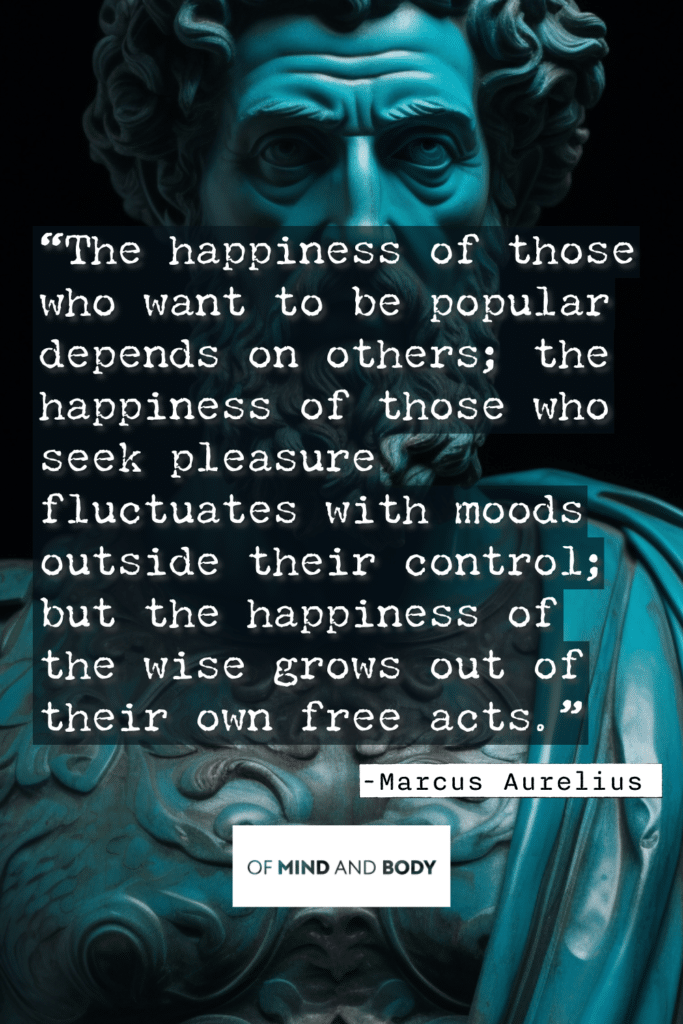
The Wisdom Behind the Words:
Marcus Aurelius in this quote differentiates between external and internal sources of happiness. He points out that seeking happiness from popularity or external pleasures is unreliable and dependent on factors beyond one’s control. In contrast, he emphasises that the happiness derived from wisdom and self-directed actions is more stable and enduring. This wisdom underscores the importance of internal fulfilment over external validation, suggesting that true happiness is self-generated and not contingent on the fluctuating opinions or circumstances of the external world.
Everyday Applications:
This quote encourages us to focus on self–improvement and making choices aligned with our values and wisdom, rather than seeking validation or pleasure from external sources. It suggests investing time in personal growth activities like reading, reflective thinking, or learning new skills, which enhance our sense of self–efficacy and internal satisfaction. Also, practising self–awareness and mindfulness can help us understand our motivations and guide us towards actions that are truly fulfilling, rather than those merely seeking external approval.
Download your FREE Values and Beliefs handbook here…
“Remember that very little is needed to make a happy life; it is all in yourself, in your way of thinking.”
Marcus Aurelius
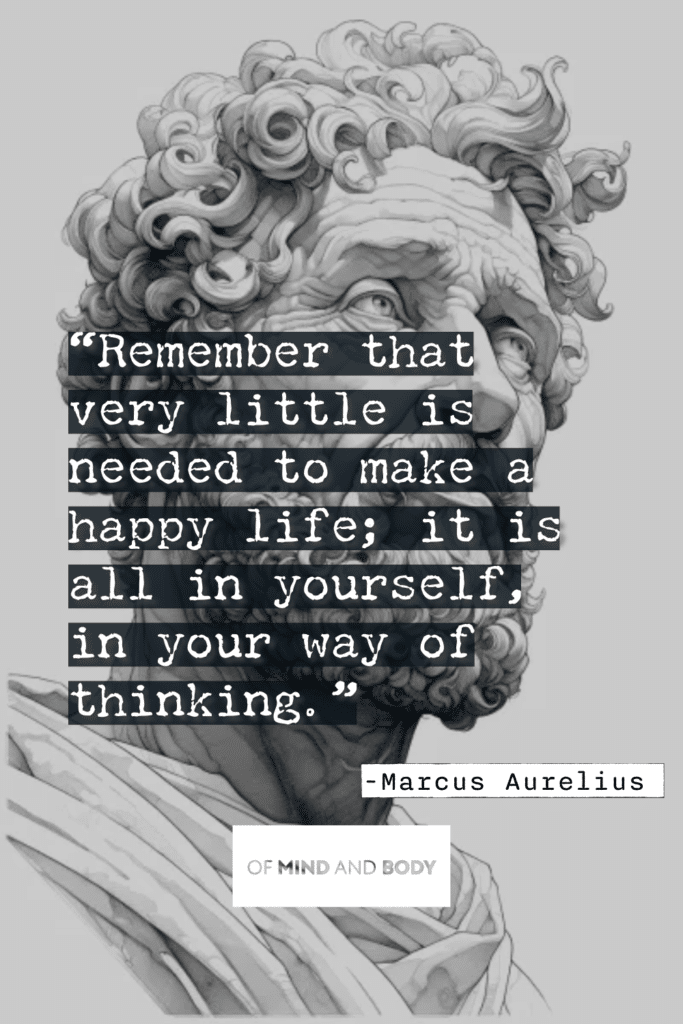
The Wisdom Behind the Words:
In this quote, Marcus Aurelius reflects on the simplicity at the heart of true happiness. He suggests that happiness isn’t contingent on external abundance or complexity, but rather, it is attainable through a simple, contented mindset. The key to a happy life, according to Aurelius, lies within our own perception and attitude towards life. This idea proposes that the source of lasting happiness is internal, and not dependent on accumulating external possessions or achievements.
Everyday Applications:
This quote guides us to appreciate simplicity and find joy in everyday life. Instead of constantly seeking more—be it material possessions, status, or experiences—we can focus on enjoying what we already have. Practising gratitude for the simple things in life, such as a moment of peace, the beauty of nature, or the warmth of a loved one, can significantly enhance our sense of happiness. Additionally, simplifying our lives by reducing clutter, commitments, and unnecessary desires can lead to a more focused, peaceful, and fulfilling existence.
“The art of living is more like wrestling than dancing.”
Marcus Aurelius
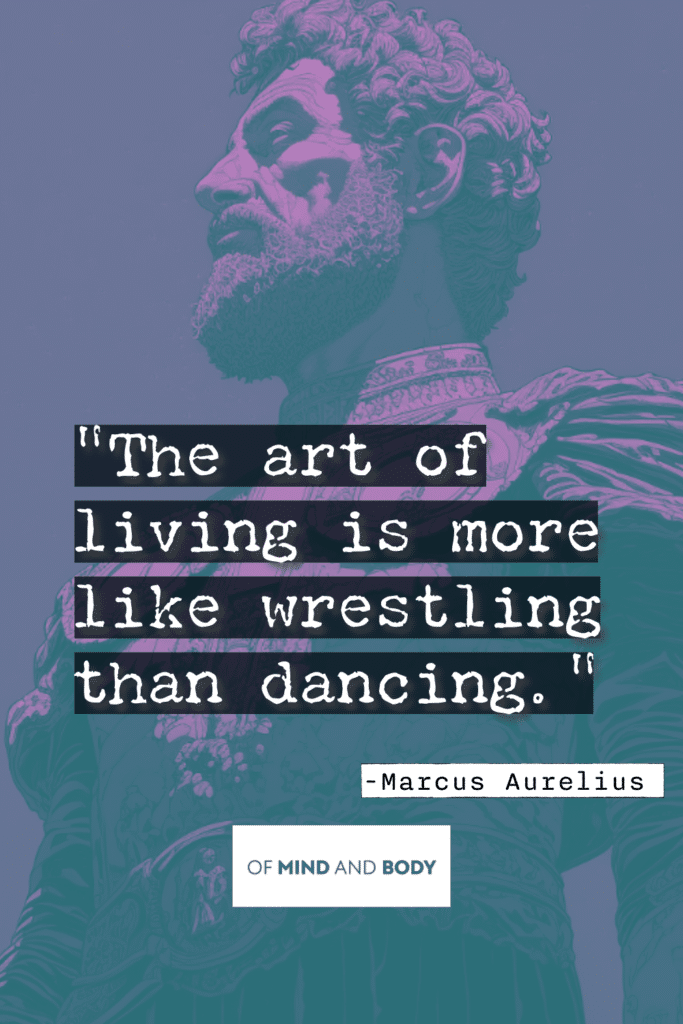
The Wisdom Behind the Words:
Marcus Aurelius here presents a vivid metaphor contrasting the nature of life’s challenges with the grace of dance and the struggle of wrestling. This quote implies that life is not always about moving effortlessly or in harmony with music, but often involves grappling with unexpected challenges and adversities. It suggests that the skill of living well involves resilience, adaptability, and strength, much like a wrestler, rather than expecting a smooth and untroubled path.
Everyday Applications:
This perspective encourages us to prepare for life’s challenges with a mindset of resilience and determination. Rather than being discouraged by difficulties, we can view them as opportunities to grow stronger and more capable. Developing skills like problem-solving, emotional regulation, and stress management can be likened to training for a wrestler, equipping us to handle life’s struggles more effectively. Additionally, maintaining a positive yet realistic outlook can help us navigate life’s complexities with both grace and strength.
Stoic Quotes on Happiness, Joy and Pleasure from Epictetus
“Don’t seek to have events happen as you want them to, but instead want them to happen as they do happen, and your life will go well.”
Epictetus

The Wisdom Behind the Words:
Epictetus, with this insightful quote, addresses the concept of acceptance and the futility of resisting the natural flow of events. He suggests that instead of trying to bend reality to our desires, we should align our desires with reality. This stoic philosophy emphasises the importance of accepting things we cannot change and finding peace in that acceptance. By embracing the events as they unfold, rather than being in constant conflict with them, we can attain a more serene and harmonious life.
Everyday Applications:
In practice, this quote encourages us to focus on our responses to situations rather than trying to control uncontrollable external events. When faced with challenges or disappointments, rather than dwelling on how things should have been, we can adapt and find ways to make the best of the situation. This approach also involves cultivating flexibility and open–mindedness, allowing us to navigate life’s uncertainties with a more balanced and less stressful mindset.
“Happiness and freedom begin with a clear understanding of one principle: Some things are within our control, and some things are not.”
Epictetus
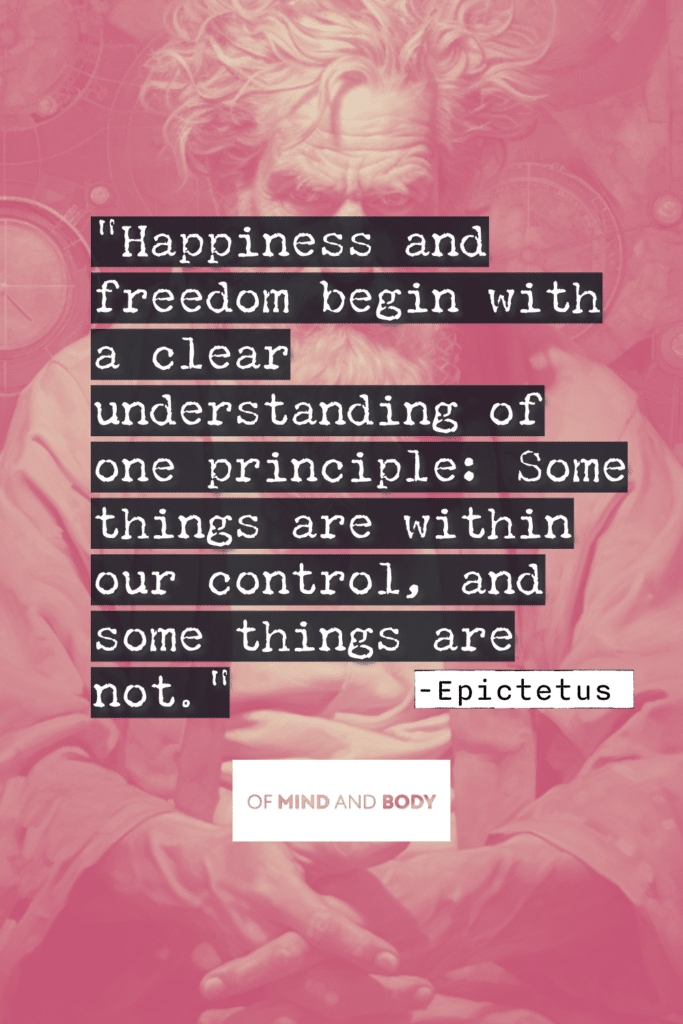
The Wisdom Behind the Words:
Epictetus highlights a crucial distinction: recognising what’s within our control and what isn’t. This quote emphasises the importance of this awareness in cultivating happiness and freedom. By grasping that our sphere of influence is confined to our actions, thoughts, and responses, rather than external happenings or others’ actions, we can concentrate on the essential, steering clear of needless frustration and disappointment.
Everyday Applications:
This insight has practical implications for daily life. It instructs us to channel our energy effectively, focusing on our own attitudes, choices, and responses instead of getting entangled in external situations or the behaviour of others. It promotes mindfulness and introspection, aiding us in discerning what we can influence and what we must simply accept. Such clarity can greatly diminish stress and enhance our inner tranquillity and satisfaction.
“Wealth consists not in having great possessions, but in having few wants.”
Epictetus
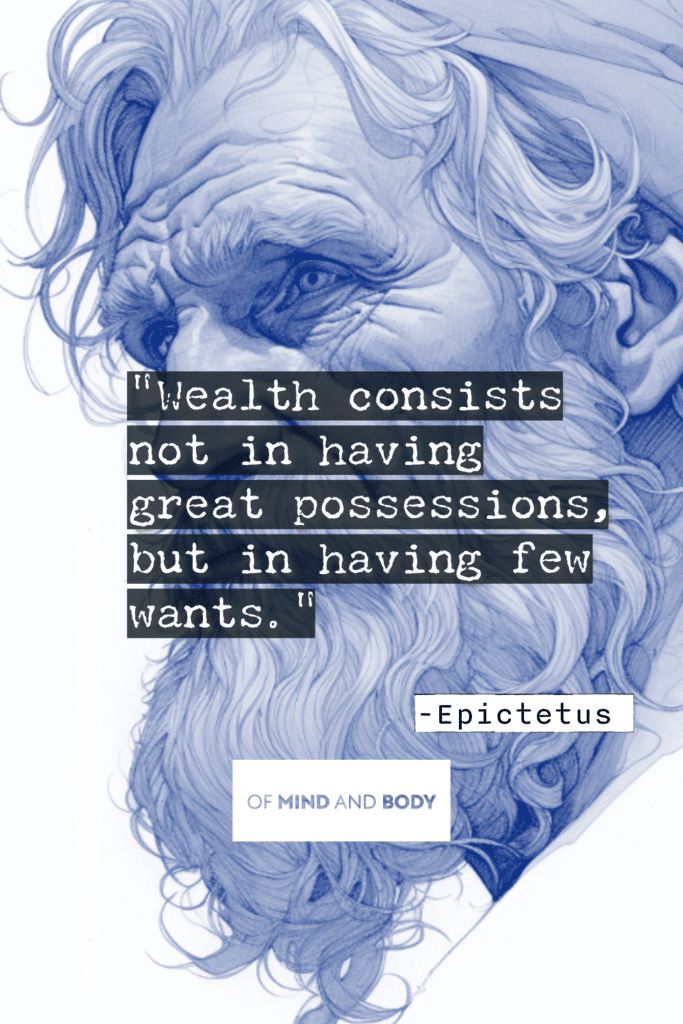
The Wisdom Behind the Words:
This quote from Epictetus touches on a profound understanding of what constitutes true wealth. He shifts the focus from external accumulation to internal contentment. The idea is that real wealth is found not in the abundance of possessions but in the simplicity of desires. By limiting our wants, we free ourselves from the endless pursuit of material gain and find satisfaction in what we already have, leading to a more peaceful and fulfilling life.
Everyday Applications:
In practical terms, this quote inspires a minimalist approach to life. By prioritising needs over wants, we can reduce the clutter in our lives, both physically and mentally. This approach not only simplifies our lifestyle but also helps in reducing stress and increasing clarity and focus. Embracing a lifestyle that values experiences and relationships over material goods can lead to a deeper sense of happiness and contentment.
“Fortify yourself with contentment, for this is an impregnable fortress you will have over your own life.”
Epictetus
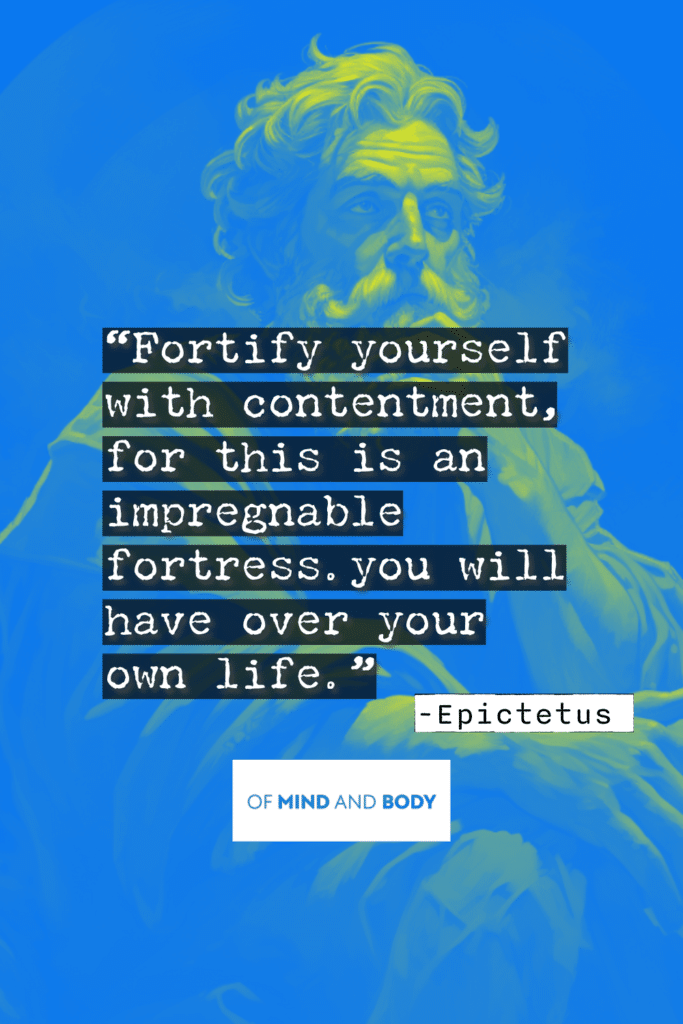
The Wisdom Behind the Words:
In this quote, Epictetus metaphorically compares contentment to a fortress, emphasising its strength and invulnerability. The essence of this message is that contentment provides a form of inner strength and protection against the unpredictability and challenges of life. By cultivating a state of contentment, we become less susceptible to external influences and the turmoil they can bring. This sense of inner peace and satisfaction acts as a shield, keeping us stable and grounded regardless of external circumstances.
Everyday Applications:
To apply this in daily life, one should practise appreciating the present and finding joy in the simple aspects of life. This could involve mindfulness practices, where we focus on the moment and cultivate gratitude for what we have, rather than longing for what we lack. Also, by setting realistic expectations and finding satisfaction in our achievements, no matter how small, we can build a resilient mindset that is content with life’s offerings. This approach helps in reducing stress and increases our overall sense of well–being.
Stoic Quotes on Happiness, Joy and Pleasure from Seneca
“True happiness is… to enjoy the present, without anxious dependence upon the future.”
Seneca
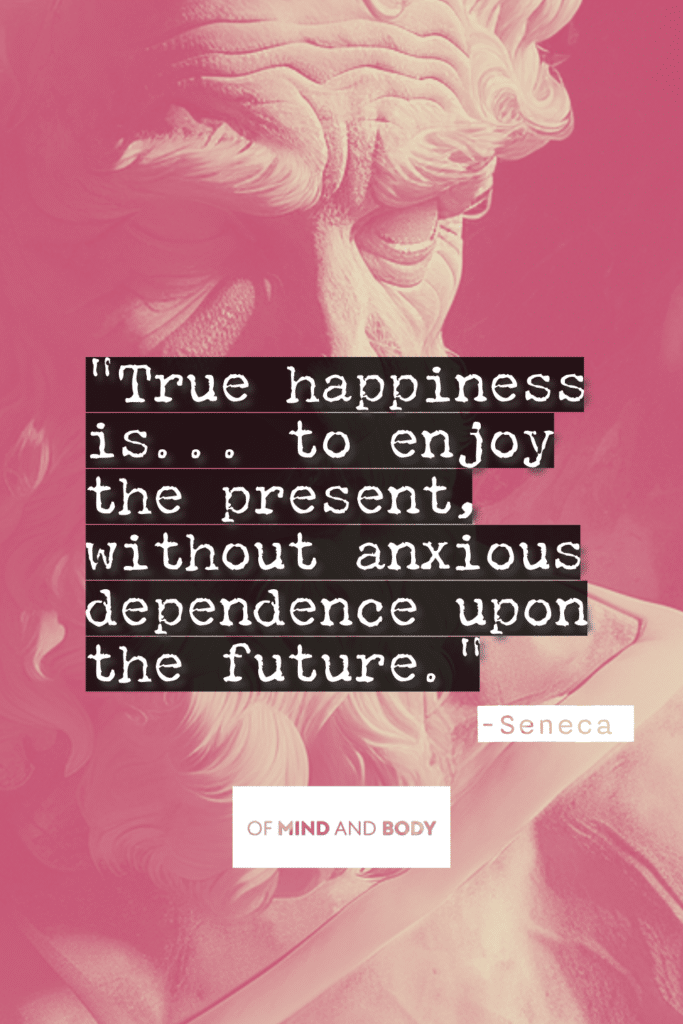
The Wisdom Behind the Words:
In this profound statement, Seneca highlights the importance of living in the present moment as a key to true happiness. He suggests that an excessive focus on the future, along with its uncertainties and anxieties, can detract from the joy and richness of the present. This quote underlines the concept that happiness is found in embracing and appreciating the current moment, rather than being perpetually fixated on what is yet to come.
Everyday Applications:
To apply this wisdom, one can practise mindfulness, which involves being fully aware and engaged in the current moment. This can be done through activities like meditation, enjoying nature, or simply being fully present in our daily interactions and tasks. By letting go of excessive worry about the future and focusing on what we can experience and influence now, we reduce stress and increase our capacity for joy. Additionally, cultivating a habit of gratitude for the present can transform our perspective and enhance our overall happiness.
“Begin at once to live, and count each separate day as a separate life.”
Seneca
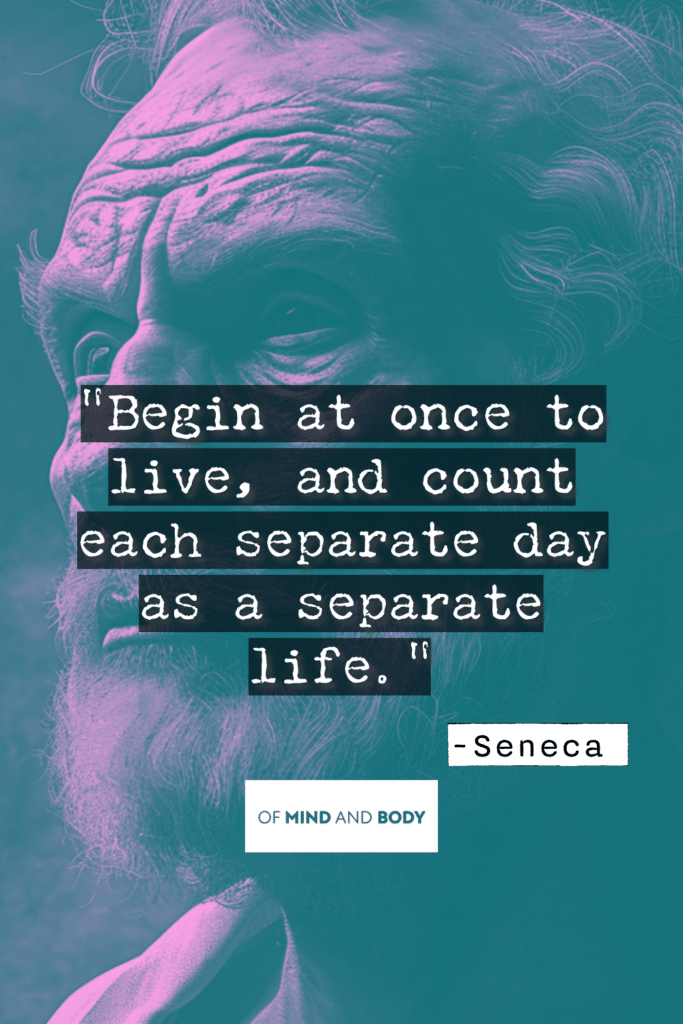
The Wisdom Behind the Words:
Seneca’s quote encourages an immediate and profound engagement with life. He advises us to view each day as a distinct and valuable life in itself, emphasising the importance of the present moment. This perspective invites us to live fully and intentionally, without postponing our engagement with life or waiting for some future moment to start truly living. It’s a call to embrace each day with the enthusiasm and commitment as if it were a whole life.
Everyday Applications:
In practical terms, this quote inspires us to make the most of each day. It encourages setting daily goals, pursuing activities that bring joy and fulfilment, and treating each day as an opportunity for a fresh start. Practising daily reflection, expressing gratitude, and actively seeking out meaningful experiences can help us cherish each day as a unique and valuable part of our lives. It also reminds us to not dwell on past regrets or future anxieties, but to focus on the present and make it as fulfilling as possible.
“It is not the man who has little, but he who desires more, that is poor.”
Seneca
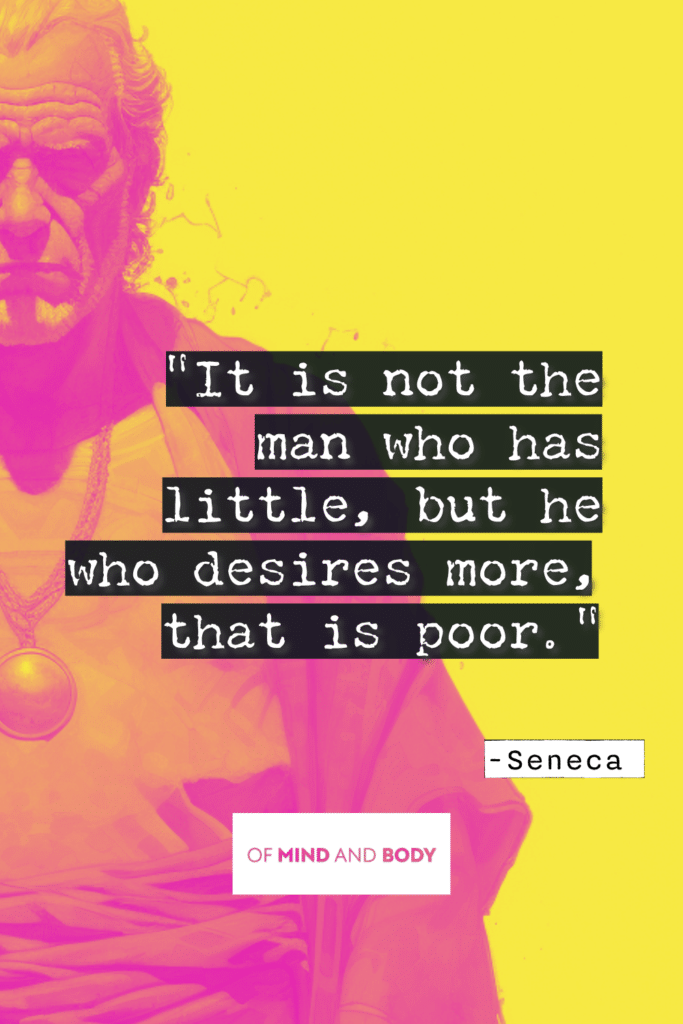
The Wisdom Behind the Words:
This quote from Seneca addresses the concept of desire and its impact on our perception of wealth and poverty. Seneca suggests that true poverty comes not from a lack of possessions, but from a relentless desire for more. This Stoic view challenges the conventional measure of wealth and poverty, placing the emphasis on internal satisfaction and contentment. It implies that a person who is content with what they have is richer than someone who, despite having much, is always craving more.
Everyday Applications:
In applying this wisdom, it’s beneficial to cultivate contentment and gratitude for what we currently have. This can involve regularly reflecting on the things we are thankful for and recognising the value in simplicity. Reducing the constant pursuit of material possessions and focusing more on non-material aspects of life, like relationships, personal growth, and experiences, can lead to greater fulfilment. By redefining our understanding of wealth, we can find a deeper sense of satisfaction and richness in our lives.
“A good character is the only guarantee of everlasting, carefree happiness.”
Seneca

The Wisdom Behind the Words:
In this quote, Seneca emphasises the importance of character in achieving lasting happiness. He suggests that external factors, such as wealth or success, cannot guarantee perpetual happiness. Instead, it is the quality of one’s character – virtues like honesty, integrity, kindness, and resilience – that lay the foundation for a deeply fulfilling and enduringly happy life. This perspective places the source of true happiness within an individual’s moral and ethical choices, rather than external achievements or possessions.
Everyday Applications:
To apply this wisdom, focus on personal development and ethical living. Cultivate virtues like compassion, patience, and integrity in daily interactions and decisions. By doing so, not only do we enrich our own lives, but we also positively impact those around us. Additionally, engaging in self–reflection and striving to be better in our actions can lead to a more meaningful and satisfying life. This approach to life builds a sense of inner peace and contentment that is not easily shaken by external circumstances.
Final Thoughts:
As we reflect on the Stoics’ profound teachings, it becomes evident that their approach to happiness offers a timeless wisdom deeply relevant to our modern lives. Stoicism isn’t just a philosophy; it’s a practical guide to living a life of contentment, resilience, and inner peace. It encourages us to look within, to find strength and happiness in our own character and choices.
We invite you to embark on this enlightening journey with us. Sign up for our Introduction to Stoicism course, and take the first step towards transforming your perspective on life and happiness. Together, we’ll explore these ancient teachings, discovering how they can be applied to our contemporary challenges and aspirations, helping you to lead a more fulfilled and balanced life. Join us, and unlock the door to enduring happiness as envisioned by the wise Stoics.


